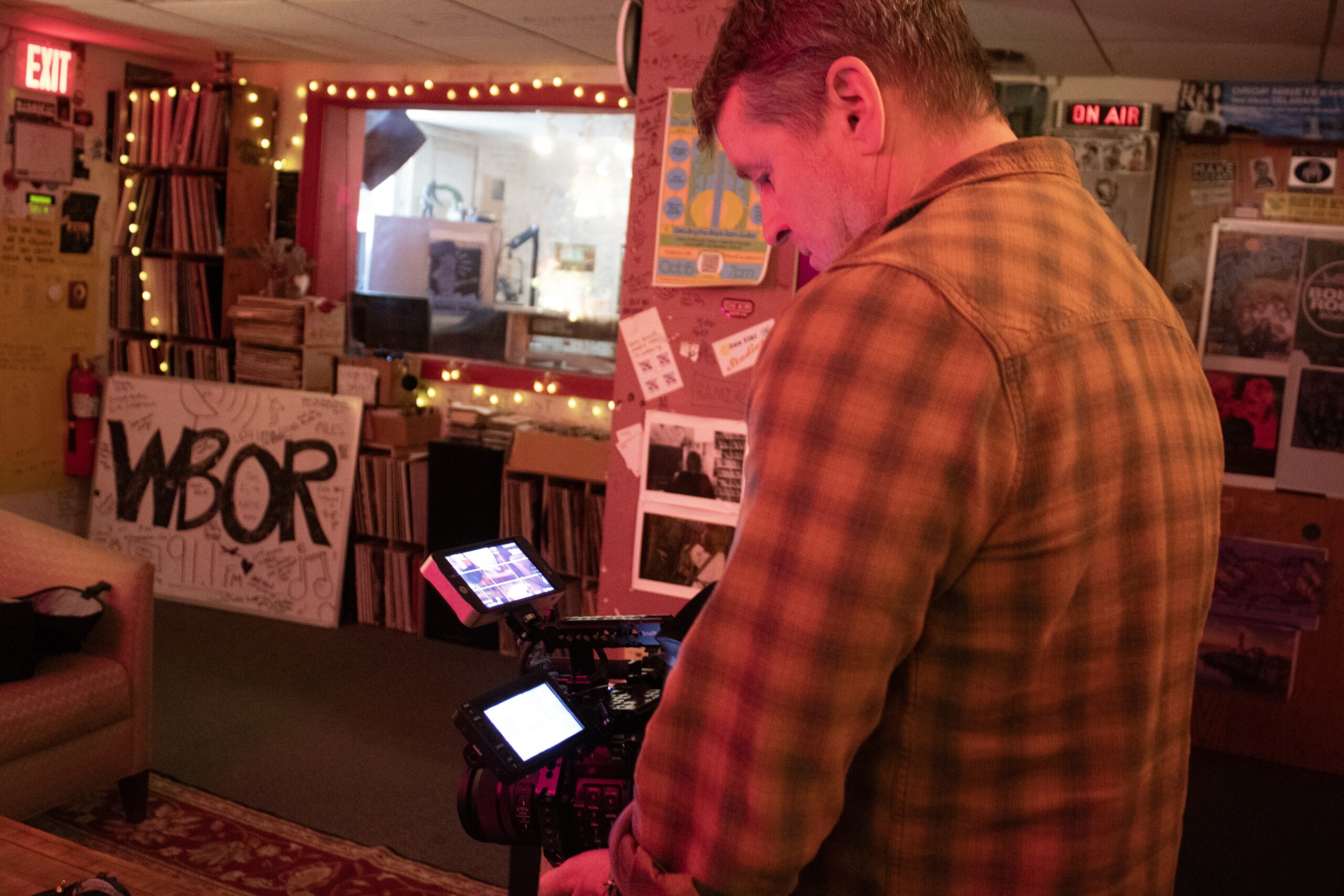WBOR DJ Moore commemorates station’s Dudley Coe home through documentary
November 8, 2024
 Janet Briggs
Janet BriggsSlade Moore sits on a faux-velvet armchair in WBOR, proudly sporting an official station t-shirt emblazoned with a vibrating cell tower and the phrase “300 watts o’ PURE POWER!”
The Brunswick area writer and filmmaker has been a DJ at the station for two years. Now, in WBOR’s last semester in the basement of Dudley Coe, he’s memorializing his devotion to the airwaves with an original documentary about the station and its evolving place in campus culture.
Filmed on campus over the past several weeks, Moore’s documentary short will explore the past, present and future of WBOR as a stronghold in Bowdoin’s music scene. It will feature interviews with current student DJs discussing the station’s unique imprints on their lives.
“The emphasis is going to be, more than anything, on the personalities that populate WBOR and make it what it is,” Moore said.
Moore said WBOR has generated rich but unexpected connective tissue between him and his Midcoast community. His radio show, “Savage Darlings,” has a “punk-adjacent” bent flavored by the proto-punk movement of the 1970s. He cited acts like the Minutemen and Johnny Thunders of the New York Dolls.
“But I mean, this morning, I was playing Creedence Clearwater Revival,” he added. “Part of the punk ethos is not hemming yourself in with too many constraints.”
It would indeed seem as if Moore is allergic to constraints, creative and otherwise. He got his start in the conservation industry before making his exit toward a career in the arts. He’s dabbled in journalism, sound engineering and now film as part of his coursework at Southern Maine Community College.
Whether he’s in the field doing research or sitting behind the camera, he’s in constant pursuit of truthful, unflinching storytelling.
“It’s honest work, and it’s authentic,” he said of his projects. “I tell it in my voice.”
It was a 70-degree October day when Moore sat down with the Orient, and all of the heat from outside seemed to collect within the graffitied confines of the basement studio. The station sound system hummed at a low volume, jumping between Beach Boys tunes and throbbing, barely-there ambient sound.
“When I come in here, I feel like I’m getting a great big hug,” Moore said. “It’s like a sanctuary.”
In the studio’s eclectic, lived-in grunginess, Moore sees unrelenting humanity.
“You don’t have to move your eyes more than a few degrees in an arc before you see something else outlandish or read some of these messages, which range from profane—[and] can be very funny, by the way—to very insightful and moving,” he said. “All that was created by people.”
For Moore, the space’s curious resonance with generations of Bowdoin students is what makes the WBOR story one worth telling. The station’s impending relocation to Coles Tower after Dudley Coe is demolished this winter made his desire to memorialize it particularly urgent.
After pitching the project to WBOR management, Moore said he received immediate support. Station manager Mason Daugherty ’25 pinged student DJs, urging them to volunteer to be interviewed on camera—a call Moore said was met with more interest than he could realistically handle.
“I love interviewing people, because I think people are fascinating, and you just don’t know what you’re going to get out of somebody,” he said. “Some of the things people have said [are] just so darn insightful…. This isn’t just a time-killer for them. They’re passionate about it.”
Filming has also meant capturing footage of the studio’s every nook and cranny, capitalizing on opportunities for shots that play with the basement’s many competing, colorful sources of light.
Unsurprisingly, the film’s sound is of particular interest to Moore. He said the story’s depth will be aided by noises both imposing and imperceptible.
“Sound is important to me … because it really informs the way you see,” Moore said. “It resonates with you almost subliminally, but it’s part of the story.”
Moore is deep in the editing process but said he’s on no strict timeline to produce a final product. Whether the film finds a home on YouTube or on the festival circuit, he’s looking forward to audiences discovering the story—and to continue discovering it, himself.
“I’m just happy to be in a place where I can express my artistic vision in ways I never imagined,” he said.
Comments
Before submitting a comment, please review our comment policy. Some key points from the policy:
- No hate speech, profanity, disrespectful or threatening comments.
- No personal attacks on reporters.
- Comments must be under 200 words.
- You are strongly encouraged to use a real name or identifier ("Class of '92").
- Any comments made with an email address that does not belong to you will get removed.

What a great article! And, featuring the making of Slade Moore’s documentary shows the depth of passion the community has for WBOR!! Congratulations!!